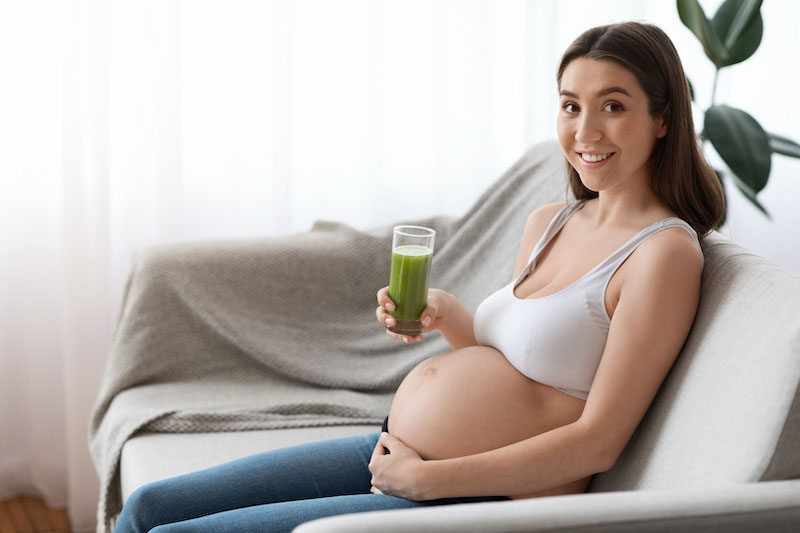Fiber is an essential part of your diet during pregnancy. Since constipation is a common problem during pregnancy, a high-fiber diet can make a difference. Also, fiber-rich foods are filling without adding a lot of calories.
What are some safe fiber supplements during pregnancy? What are some high-fiber foods you can eat during pregnancy? Before answering these questions, be sure you are always in touch with your doctor before making any changes.

Fiber Supplements While Pregnant
There are many benefits of fiber intake during pregnancy and the following are reasons why it is important to supplement your fiber during pregnancy.
1. Controls Pregnancy Weight
Fiber-rich foods keep you feeling full and satisfied longer. This is helpful in managing pregnancy weight gain because it decreases hunger and prevents you from excess calorie intake.
2. Prevents Constipation
As previously mentioned, constipation is a common complaint during pregnancy. Fiber eases bowel movement and adds bulk to your stools, which helps relieve constipation.
3. Regulates Blood Sugar Levels
Adding fiber to your diet will slow down food absorption. This is beneficial because it prevents your blood sugar from rising quickly.
4. Lowers the Risk of Cardiovascular Diseases
Soluble fibers can lose bad cholesterol by binding to cholesterol-rich bile acids in the digestive tract. This reduces the risk of cardiovascular illness.
5. Reduces the Risk of Preeclampsia
Extra dietary fiber will lower the risk of high blood pressure and the risk preeclampsia.

Read More
- How to Get Your Desire Back After Pregnancy
- Tips On Eating Habits For A Healthy Life
- How To Keep Your Knees and Hips Healthy?
High Fiber Foods for Pregnancy
Types of Fiber
There are two types of fiber. According to the Mayo Clinic, fiber is classified as soluble and insoluble.
Soluble Fiber
Soluble fiber dissolves in water to form a gel-like material. Soluble fiber can help lower blood cholesterol and glucose levels. It can be found in oats, peas, beans, apples, citrus fruits, carrots, barley, and psyllium.
Insoluble Fiber
Insoluble fiber promotes the movement of material through the digestive system and increases stool bulk. This helps those who struggle with constipation or irregular stools. Whole-wheat flour, wheat bran, nuts, beans, and vegetables, such as cauliflower, green beans and potatoes, are good sources of insoluble fiber.

High-Fiber Foods
There are many high-fiber foods to help you during pregnancy.
1. Avocado
Avocado is a great source of digestible and indigestible fiber. Besides getting things moving it is also very filling. Avocados can be eaten on their own, smashed on toast, blended into a smoothie, or added to a salad.
2. Chia seeds
Chia seeds are high in fiber as well as a healthy source of fat and protein, calcium, phosphorus, and zinc. The seeds are digestible and can become gelatinous when added to liquid. Chia seeds can be particularly helpful to relieve constipation during the first trimester.
3. Bran Cereal
Bran is the outside covering of grain. Popular brand cereals contain wheat, rice, oats, and other whole grains. Bran cereal can be eaten with milk, or incorporated into baked goods such as muffins or cookies.
4. Lentils
Lentils are a good source of fiber, protein, potassium, folate, iron, and magnesium. This can help with constipation. Lentil soup makes a great meal, and also provides increased fluid which is helpful during pregnancy.
5. Flaxseed
Flaxseed contains digestible and indigestible fiber. It also can provide protein, heart-healthy fats, antioxidants, and vitamins. Flaxseed can be added to food similar to chia seeds, sprinkled on yogurt, or blended into a smoothie.
During pregnancy, flaxseed should be eaten in small amounts and used in moderation because it may have a hormonal influence. Check with your healthcare provider before incorporating flaxseed into your diet during pregnancy.
6. Chickpeas
Chickpeas, or garbanzo beans, are the main ingredient in hummus. They are a great source of fiber and plant-based protein. Chickpeas must be cooked thoroughly before eating and can be added to salad or roasted until crisp.
7. Fresh Pears
Fresh pears are one of the most popular fruits in the world. They are a great source of fiber, vitamin C, potassium, and antioxidants. Pears can help relieve constipation. They can be eaten cooked or raw.
8. Quinoa
Quinoa is a gluten free whole grain. It’s a good source of fiber, protein, and vitamin E. It is quick cooking and can be eaten as the base of a grain bowl.
9. Baked Sweet Potato or Yam (With Skin)
Baked sweet potatoes or yams are a great source of fiber and can help constipation. These can be incorporated into your baby’s diet as one of the first early foods.
10. Baked Potato With Skin
Baked potatoes are a good source of fiber. However, much of the fiber is in the skin. Potatoes also help with nausea. You can make mashed potatoes, potato soup, or scalloped potatoes.
11. Green Peas
Green peas are a good source of fiber, protein, vitamins, and other supplements. They are a starchy vegetable so pairing them with a non-starchy vegetable like broccoli, gives you a good balance.
12. Bulgur
Bulgur wheat is common in the Mediterranean part of the world. It is a grain from wheat but has the texture of quinoa. This is helpful for relieving constipation. Bulgur can be eaten warm with milk or a base grain bowl with egg and ground turkey.
13. Raspberries
Raspberries are the first fruit on the list as a great source of fiber. They can be eaten frozen or fresh. Raspberries are good with cereal, smoothies, or on toast.
14. Steel-cut oatmeal
Oatmeal makes for a good breakfast. Oats can also be in the form of granola or a granola bar. You can mix oats into cookies, breads, or muffins. Oatmeal can help nausea and it’s high fiber content is filling.
15. Blackberries
Blackberries are another berry with a good source of fiber. They can be eaten raw, cooked, in a smoothie, or even on a salad.
16. Almonds
Almonds are a popular nut with a good source of fiber. They’re easy to have on the go and an easy snack. Almonds can also be incorporated into granola or yogurt. Almonds are also a great substitute for peanuts if there are any allergy issues.
17. Spinach
Lastly, spinach is a great source of fiber. It can be cooked or raw, and is safe during pregnancy. It can be blended into smoothies or mixed into eggs with breakfast.
As you can see, there are many simple and creative ways to incorporate fiber into your diet.
Fiber Supplements While Pregnant
Besides eating the different foods to help with your fiber intake, there are fiber supplements you can take during pregnancy. There are lots of recipes and ways to incorporate supplements into your diet. This includes mixing it in water or baking with it.
Hopefully, this gives you some good ideas when it comes to adding fiber to your diet during pregnancy. As mentioned at the beginning of this article, you should always consult your doctor before making any changes.